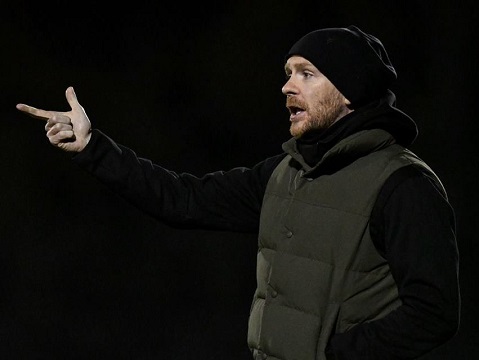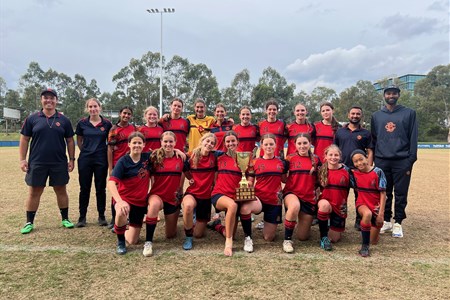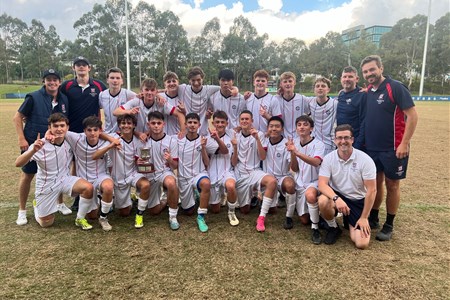McCormick farewells Tigers for Sunderland FC

Northern Tigers coach Mark McCormick will next week bid farewell to Sydney to take on the role of head of coach development at former English Premier League club Sunderland.
The Scot, who hails from Wishaw, North Lanarkshire, just outside of Glasgow, has spent the past three seasons coaching in the second tier of NSW football and while he loves the Sydney lifestyle, the opportunity offered by the “Black Cats” was too good to refuse.
“My role at Sunderland will be directly under the academy manager and I’ll be responsible for all coaches from Under 8s to Under 23s,” McCormick explains. “The Under 23s play in Premier League 2 so it’s going to be exposure to clubs like Liverpool, Man United, Chelsea, Man City and Arsenal. I won’t be in charge of a team, which will be unusual. My team will be the coaches.”
McCormick began his professional football career as a teenager, signing forms with Scottish second division club Livingstone FC. A former winger and centre forward who ultimately found his niche as a midfielder, McCormick also had stints at Ross County and Berwick Rangers and faced Scottish giants Glasgow Rangers and Aberdeen in Cup ties before injuries curbed his career.
“When I was at Livingstone we beat Aberdeen in a Cup tie at Pittodrie; and I played against Glasgow Rangers twice for Ross County when Rangers were in their prime,” McCormick says. “They had players like (former Chelsea star) Tore Andre Flo, who transferred there for a record 12 million pounds; and (Argentinian superstar) Claudio Caniggia. They were full of internationals, they were a big time team.”
In the first Rangers clash, Ross County took on the might of the ‘Gers in front of a full house and live Sky television audience, losing 1-0 after missing a late penalty. That miss cost the wee club a replay at Ibrox, Rangers’ famous home ground.
In the second clash, again televised live on Sky, Tore Andre Flo scored twice to give Rangers a 2-0 lead but County struck back and levelled the score at 2-all before Barry Ferguson scored a late winner for Rangers. For McCormick, these were the games he lived for.
McCormick left Ross County for a brief stint at Berwick Rangers, where a ruptured cruciate ligament ended his playing days in Scotland.
“I’d had injuries for basically my entire career,” McCormick explains. “I had my first knee operation at 17, second one at 18, and when I went to Berwick Rangers I ruptured my cruciate ligament.”
Unfortunately for McCormick, the club initially refused to pay for his operation but some pressure from a local journalist forced them to reconsider.
“The journalist said that if the club didn’t pay for the operation he would do a back page story that wouldn’t reflect well on Berwick Rangers. I’d also organised a surgeon through a friend, who was one of the best, and he was going to do the operation cheap. But the club still didn’t want to pay. Thanks to the pressure applied by the journalist they finally agreed to pay for the operation.”
By that stage of his career, McCormick had fallen out of love with football and after limping away from the Scottish game, he jetted his way across the Atlantic to accept a U.S. soccer scholarship at a small school in Virginia.
America proved to be a breath of fresh air for McCormick, who thrived in his new environment, studying and playing football. After three years in Virginia, the Scot relocated to a satellite facility of the University of Texas, right on the Mexican border..
“We were literally 500 metres from the Mexican border and there was a lot of cartel activity at that time,” McCormick says. “There were gun battles going on and we used to go over to Mexico. It was a pretty intense place.”
McCormick enjoyed his six-year stint in the U.S. and even better, he met his partner Birgit in New York City. Being of Austrian descent, Birgit convinced her man that Vienna was a wonderful place to live and should be their next port of call.
With his playing days seemingly behind him, McCormick agreed and while Birgit knew some people at Austria’s most successful club, Austria Vienna, the Scotsman spoke to the head of the club’s academy and was offered a position as a volunteer assistant coach.
Working for free for six months, and two years after playing his last game, McCormick pulled on the boots yet again, joining one of his coaching colleagues at a local third division outfit.
“It was fantastic, we’d play against the second teams of some of the country’s biggest clubs, like Austria Vienna and Rapid Vienna,” McCormick says. “But unfortunately I got injured again and being in my early thirties realised that my playing days had finally come to an end.”
Austria Vienna offered McCormick a fulltime position as an elite individual coach and also as assistant coach for the Under 15s. During that period he also studied for his coaching licences, flying between Vienna and Scotland every month for a year.
McCormick also taught English at one of the club’s partner schools (similar to Westfield Sports High School) and learnt to speak German at night classes, making life in the Austrian capital a busy and productive one.
“I loved my time in Vienna. Football-wise, I learnt about professionalism and structure at a fantastic club, one of Europe’s big clubs.”
Mark and Birgit then decided to spread their wings yet again and this time, Australia was their destination.
“Birgit had previously spent time in Australia and I’d always wanted to live there because my grandfather’s brother had emigrated there back in the 60s,” McCormick explains. “So I grew up with a curiosity for Australia so we decided to move down here in 2012. We lived here for a year and I worked as head coach at Sydney Uni.”
But then Austria Vienna came calling and offered McCormick another job at the academy so the pair packed their bags and headed back to Europe, with McCormick taking the opportunity to finally complete his coaching licences.
The couple returned to Australia in 2015 and McCormick landed a gig with Northern Tigers Under 20s while completing a Masters of Sports Coaching at Sydney University. The following season he accepted an offer to join Spirit FC as first grade coach, but after one season returned to North Turramurra.
“I thoroughly enjoyed my time at Spirit, they were nice guys, but the job wasn’t necessarily what I wanted. The position the Tigers offered to me just seemed to be a better fit and better for me all round.”
McCormick’s young Tigers had a fantastic season and reached the elimination semi-finals, only to be knocked out by Mt Druitt via penalty shootout.
“What we achieved at Northern Tigers this year was a highlight for me,” McCormick says. “We’re a really young group and the guys should be proud of their season. The players were fantastic the entire year. Everyone worked hard in training and on the field. And we had a superb backroom staff as well. It’s something I’m extremely proud of.”
When asked to name his career highlights, the 38-year-old replied: “I scored on my professional debut after 47 seconds against Stirling Albion. That was my highlight so you could say my career went downhill after 47 seconds!
“Truthfully, there were many highlights – playing against Rangers live on Sky, beating Aberdeen at Pittodrie. Playing in front of 10,000 was always fun. When I was younger and doing really well there was talk of clubs like Tottenham and Liverpool showing an interest in me, and although that never materialised, it’s always exciting hearing your name mentioned in that kind of thing.
“Coaching-wise, my highlights include being on the coaching staff at Austria Vienna and being a part of the Nike Tournament which involves the best academies in Europe. Coaching against top European teams like Bayern Munich is a fantastic event to be involved in.”
When asked if the game in Australia has changed during the time he has been here, McCormick replied: “I think the game has improved. I definitely think the facilities are getting better and there are a lot of people who are pushing the game in the right direction.
“Australia has unique problems with other codes that are deeply embedded in local culture, but those codes are struggling to get participation numbers. I think football just needs to be patient here.
“People are pushing for year-round football which is really good and the fact that A-League clubs like the Western Sydney Wanderers, Central Coast and Sydney FC are playing their academy teams in the lower divisions is a really good thing. It might not seem like it at the moment but allowing young players in the academies to play against men in a Mens’ competition is good for their development. It’s the done practice in continental Europe, especially in places like Germany, Austria and Holland – where they’ve produced some good players over the years.
“Australians are impatient, they just want everything yesterday whereas European nations have had structures in place for decades.
“A second league below the A-League would help but I understand why they’re a little bit wary of that because financially I have no idea how it’s viable.”
McCormick can’t wait to start his gig at Sunderland but unfortunately Birgit won’t be joining him in England’s Northeast and will instead remain in Sydney.
“It’s an exciting opportunity for me but it’s going to be tough because Birgit is staying here in Sydney while I’m away,” McCormick says. “She’s in a managerial role here so she’s staying. But we both understand it’s an opportunity I can’t refuse. If it goes well Birgit might move there but if it doesn’t go well, I can always move back here. We’ll see how it goes. If you don’t try, you’ll never know.”
-By Derek Royal, Football NSW Reporter


